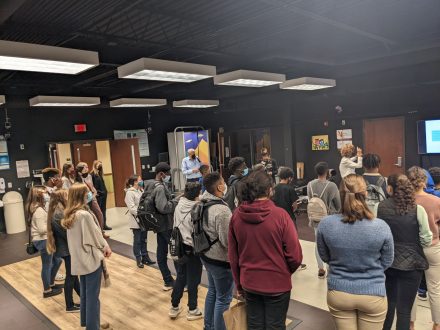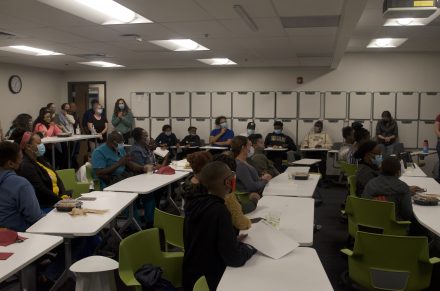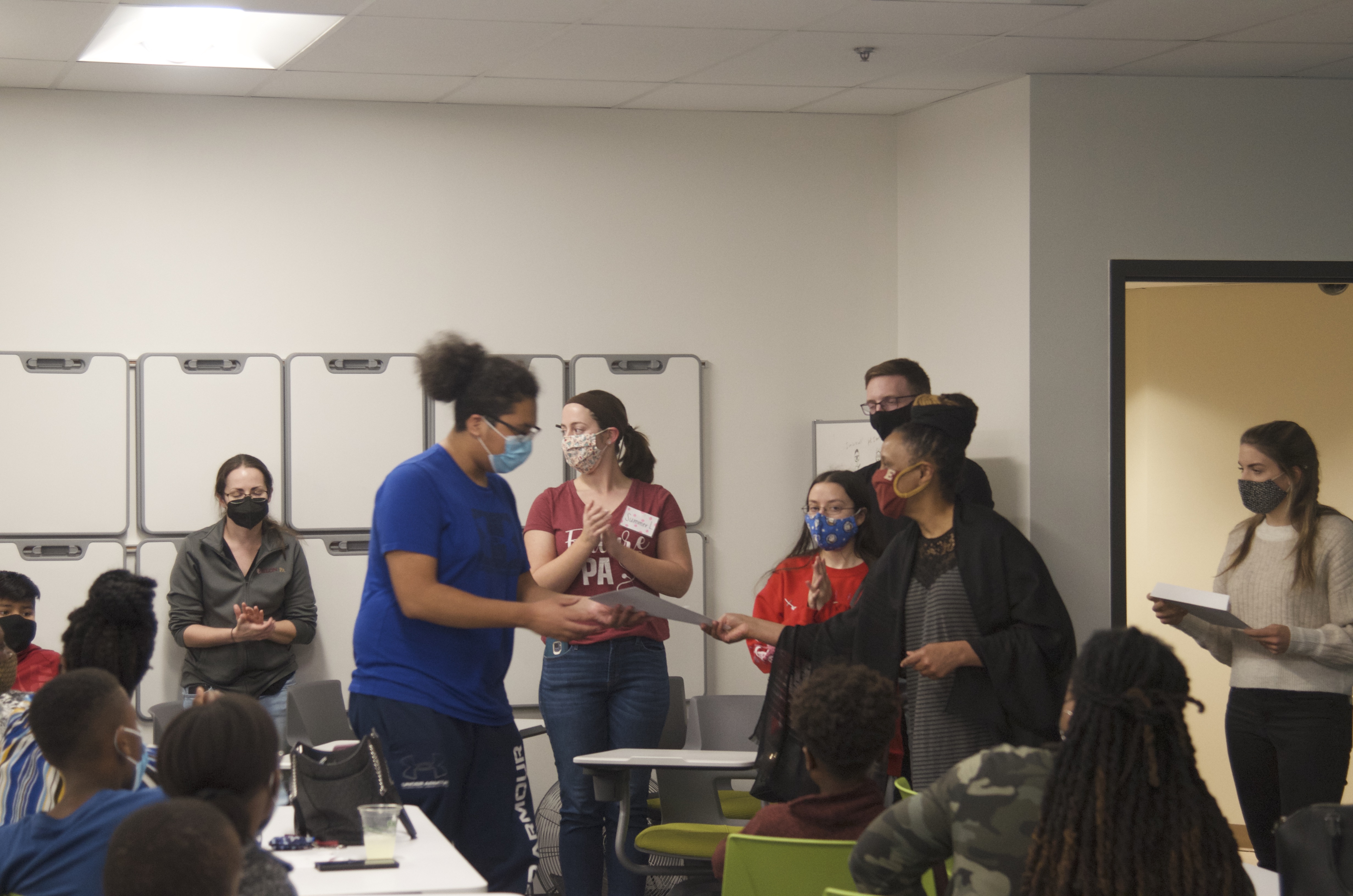Physician assistant students in Elon's "underserved populations" course worked with 20 ABSS middle and high schoolers for the fall 2021 to increase the interest of potentially pursuing a career medicine among young minority men.
Elon University’s new Start Early in Medicine initiative has been emboldening and supporting Alamance County youth as the program seeks to increase the number of Black and Latinx men who pursue careers in medicine.
Operating under the umbrella of Elon’s “It Takes a Village” project, Start Early in Medicine focuses on exposing these students early in their lives to what a career in the health care industry could entail. Expanded in May 2021 to include Elon, the program is a partnership between the Village Project, Elon’s Physician Assistant Studies program and Alamance Community College.
Every Thursday for the fall 2021 semester, the 37 Elon PA students in the program’s “underserved populations” course met with the 20 males from Alamance-Burlington School System middle and high schools to expose them to a potential career in medicine.

The project began initially with the ACC’s Medical Bridge: Minority Men in Medicine initiative, which started in 2019. The initial focus of the program was to bring in professionals within medical fields who are minorities to talk about their work and their career paths. With the expansion earlier this year, Elon is now working with ACC to provide the Start Early instructional component to the initiative.
This fall, these ABSS students have been exposed to much of the same material Elon’s graduate health sciences students are exposed to, but specially designed for them. “I took the PA medicine curriculum and physical exam, and I tailored it to middle schoolers with the same teaching and outcome,” said Alexis Moore, assistant professor of physician assistant studies and director of the Start Early in Medicine program.
In the Classroom
In the first semester working with middle and high schoolers, Moore said they went over the anatomy, physiology and physical examination of the eye and ears.
Andrew Lopez-Gonzalez, an eighth-grade student at Graham Middle School, said studying the ear was his favorite part. He was particularly in the cochlea and how it connected to a person’s sense of balance.
Lopez-Gonzalez admitted that he wasn’t all that interested in the project from the start. But after a few weeks of hands-on learning, meeting new friends and gaining new experiences, he’s glad that he listened to his mother and joined. Lopez-Gonzalez said that he’s now thinking about one day becoming a chiropractor, therapist or surgeon.
“I want to help people. That’s one of the main things I want to do,” Lopez-Gonzalez said.
 They may not realize it, but Lopez-Gonzalez and his 19 fellow ABSS students in this initial cohort have also helped the PA students who have been working with them over the semester.
They may not realize it, but Lopez-Gonzalez and his 19 fellow ABSS students in this initial cohort have also helped the PA students who have been working with them over the semester.
“The kids have taught me a lot about myself, but also just people in general. They taught me that each student, like each patient, is going to require different things from you and what works for one person isn’t going to work for another one,” said Sarah Akihary, a first-year PA student.
Working with young men has taught her the importance of having role models. In the beginning, Akihary said she didn’t know how much time she would have to devote to the program but each week, much like the students they were teaching, she grew to love it more and more.
“When I first heard that I was going to be teaching high schoolers, I was terrified because I didn’t know how I was going to get them engaged. But they gave me a lot of confidence going into clinical year and I feel like I’m able to take on whatever is going to come,” Akihary said.
Morgan Darrow, a first-year PA student, said that spending so much time with middle schoolers and men of color has made her able to empathize with people different than her.
“The more I can get to know people that are different, that’ll make me a better provider,” Darrow said.
Seeing is Believing
Young students learn better through tangible learning, as well as seeing people who look like them, Moore said. This fall the students found both at an annual symposium at Elon.
On Nov. 4, the Department of Physician Assistant Studies hosted the Underserved Populations Symposium, which this year had the theme “Education as a Social Determinant of Health for the ABSS student.” At the symposium, the ABSS students were able to hear first-hand from various Black health care experts and professionals about their journey and experiences working within medicine.
Dr. Russell J. Ledet, one of the founders the “The 15 White Coats,” a nonprofit organization with the mission to “reimagine cultural imagery and storytelling in learning environments, and to increase access to medical school through scholarships.”
The 15 White Coats is centered around a photo taken of Ledet and 14 other Black Tulane University medical students in front of slave quarters at the Whitney Plantation, Louisiana. That image was used on this symposium’s program as a call to the legacy of education for children of color.
Other speakers at the symposium included Dr. Cedric Bright, interim associate dean of diversity & inclusion at the Brody School of Medicine at East Carolina University, ACC President Algie Gatewood. Elon Associate Professor of Psychology Buffie Longmire-Avital, and Jean Rattigan-Rohr, vice president for access and success.

An accompanying interdisciplinary pop-up career fair included high-yield presentations in physical therapy, sports medicine, biomechanics, ultrasound and nursing. Elon faculty and staff members Jesse Akman, Patrick Rudd, Srikant Vallabhajosula, Paula DiBiasio, Shefali Christopher, Will Cooner and Tiffany Morris helped with the career fair.
“It’s difficult to promise somebody you can be a doctor but you’re not around doctors and you’re not able to see anything related to that field up close,” Moore said. “Seeing people that look like you in medicine is part of the reinforcement.”
Long-term Impact
With the trend in minority male medical school candidates decreasing over recent years and only 515 Black Americans on a path to becoming a doctor, the Journal of Racial Ethnic Health Disparities has called this shift “an American crisis.”
This crisis won’t be eradicated overnight. But through the consistent and diligent work of dedicated people that create programs such as the Start Early in Medicine initiative, the seeds will be planted in creating a crop of future minority males in medicine.
“It is my hope that our PA students are seeing just how influential and positive your interaction with middle and high school students have been over these past weeks,” Rattigan-Rohr said. “We can’t wait to see where this particular initiative leads as our middle and high school students broaden their understanding of the human body.”



